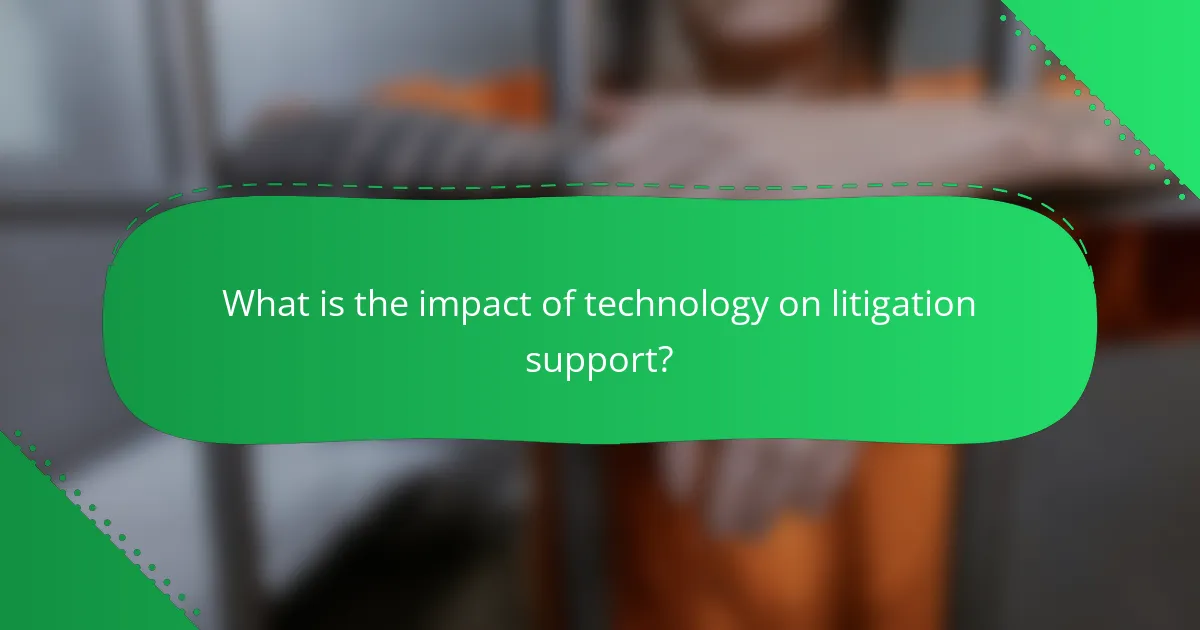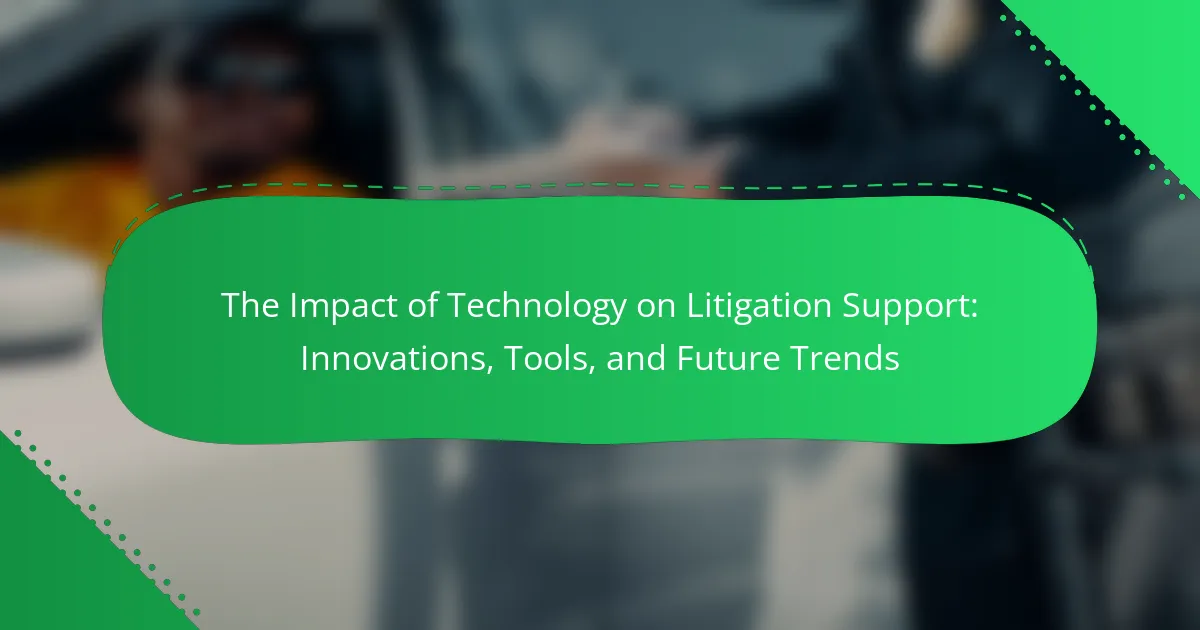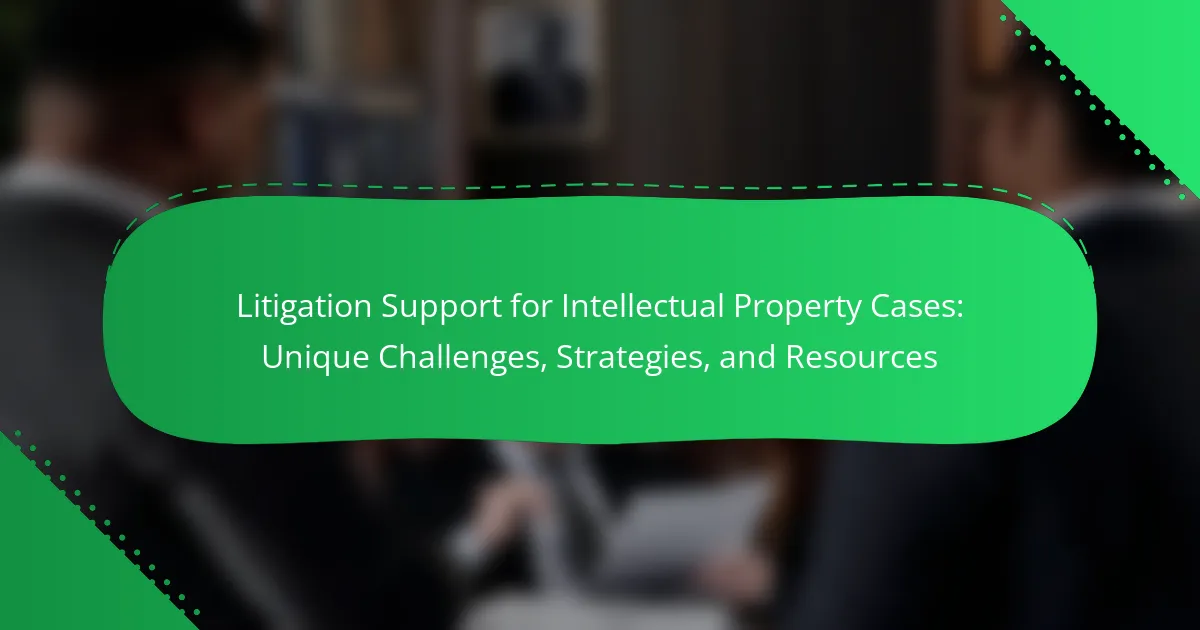Technology plays a crucial role in enhancing litigation support by significantly improving efficiency and accuracy within legal processes. Advanced software solutions facilitate faster document retrieval and management, while e-discovery platforms streamline evidence gathering and analysis. Automation of repetitive tasks allows legal teams to concentrate on strategic elements, and improved collaboration tools enable team members to work effectively from various locations. Additionally, data analytics provide valuable insights for case strategies, and robust cybersecurity measures safeguard sensitive information, ensuring compliance with legal standards. This article explores the impact of these technological innovations on litigation support, highlighting key tools and future trends in the field.

What is the impact of technology on litigation support?
Technology significantly enhances litigation support by improving efficiency and accuracy. It enables faster document retrieval and management through advanced software solutions. Tools like e-discovery platforms streamline the process of gathering and analyzing evidence. Automation reduces the time spent on repetitive tasks, allowing legal teams to focus on strategy. Additionally, technology facilitates better collaboration among team members, regardless of location. Data analytics tools provide insights that inform case strategies and decision-making. Cybersecurity measures protect sensitive information, ensuring compliance with legal standards. Overall, technology transforms litigation support into a more streamlined and effective process.
How has technology transformed the litigation support landscape?
Technology has significantly transformed the litigation support landscape by enhancing efficiency and accuracy. Digital tools streamline document management and review processes. E-discovery software automates the identification and collection of relevant evidence. Cloud-based platforms facilitate secure sharing and collaboration among legal teams. Artificial intelligence assists in analyzing large volumes of data quickly. These innovations reduce the time and costs associated with litigation. According to a 2021 report by the International Legal Technology Association, 70% of firms reported improved case outcomes due to technology adoption. Overall, technology has reshaped how legal professionals approach litigation support.
What are the key technological advancements in litigation support?
Key technological advancements in litigation support include e-discovery tools, case management software, and artificial intelligence. E-discovery tools streamline the process of identifying, collecting, and reviewing electronic documents. They enhance efficiency in managing large volumes of data. Case management software helps organize case information, deadlines, and communications. This improves collaboration among legal teams. Artificial intelligence assists in predictive coding and document analysis. It reduces the time and cost associated with legal research. These advancements collectively improve the accuracy and speed of litigation processes.
How do these advancements enhance the litigation process?
Advancements in technology enhance the litigation process by improving efficiency and accuracy. These innovations streamline document management and discovery. E-discovery tools can process vast amounts of data quickly. This reduces the time lawyers spend on information gathering. Artificial intelligence aids in legal research, providing faster access to case law. Predictive analytics can forecast case outcomes, helping lawyers strategize effectively. Furthermore, virtual courtrooms facilitate remote hearings, increasing accessibility. These enhancements lead to cost savings and more effective case management.
What are the main tools used in litigation support today?
The main tools used in litigation support today include e-discovery software, case management systems, and document review platforms. E-discovery software helps legal teams manage electronic evidence efficiently. Popular options include Relativity and Logikcull, which streamline the identification and collection of relevant documents. Case management systems like Clio and MyCase organize case information and facilitate collaboration among team members. Document review platforms such as Everlaw allow attorneys to review large volumes of documents quickly and effectively. These tools enhance productivity and accuracy in the litigation process.
What software solutions are commonly utilized in litigation support?
Common software solutions utilized in litigation support include e-discovery tools, case management software, and document management systems. E-discovery tools like Relativity and Logikcull help manage large volumes of electronic data. Case management software such as Clio and MyCase streamlines case organization and communication. Document management systems like iManage and NetDocuments facilitate secure document storage and retrieval. These tools enhance efficiency and accuracy in managing legal cases. Their adoption is critical as legal professionals increasingly rely on technology to handle complex litigation processes.
How do these tools improve efficiency and accuracy in legal cases?
Legal technology tools improve efficiency and accuracy in legal cases by automating routine tasks. These tools streamline document management, reducing the time lawyers spend on administrative work. For example, e-discovery software can quickly analyze large volumes of data. This speeds up the identification of relevant evidence. Additionally, legal research tools provide instant access to case law and statutes. This enhances the accuracy of legal arguments and reduces the risk of errors. Analytics tools can predict case outcomes based on historical data. This helps lawyers make informed decisions about strategy. Overall, technology reduces human error and increases productivity in legal practices.
What innovations are shaping the future of litigation support?
Artificial intelligence (AI) is revolutionizing litigation support through enhanced data analysis and document review. AI tools can quickly sift through vast amounts of legal documents, identifying relevant information with high accuracy. Predictive analytics is another innovation, allowing legal teams to forecast case outcomes based on historical data. This helps lawyers strategize more effectively. Cloud-based platforms are also transforming litigation support by enabling real-time collaboration among legal professionals. These platforms facilitate secure access to case files from anywhere, improving efficiency. Additionally, e-discovery tools have advanced, automating the process of collecting and reviewing electronic evidence. These innovations collectively streamline litigation processes and reduce costs.
How is artificial intelligence influencing litigation support?
Artificial intelligence is significantly influencing litigation support by enhancing efficiency and accuracy. AI tools streamline document review processes, reducing the time lawyers spend on manual tasks. These tools can analyze large volumes of data quickly, identifying relevant information and patterns. Predictive analytics powered by AI helps attorneys assess case outcomes more accurately. AI-driven legal research tools provide faster access to case law and statutes. These advancements lead to cost savings for clients and law firms. According to a report by the International Legal Technology Association, 75% of firms using AI in litigation support reported improved efficiency. The integration of AI in litigation is transforming traditional practices and setting new industry standards.
What role does data analytics play in modern litigation support?
Data analytics plays a crucial role in modern litigation support by enhancing the efficiency and accuracy of legal processes. It enables legal teams to analyze large volumes of data quickly. This analysis helps in identifying relevant evidence and patterns that may influence case outcomes. Data analytics also assists in predicting litigation trends based on historical data. By leveraging analytics, legal professionals can make informed decisions and develop effective strategies. Furthermore, studies show that firms using data analytics report improved case management and reduced costs. For example, a report by the International Legal Technology Association found that data-driven approaches lead to a 30% increase in case resolution speed.
What challenges do legal professionals face with technology in litigation support?
Legal professionals face several challenges with technology in litigation support. One major challenge is the rapid pace of technological change. Keeping up with new tools and software can be overwhelming. Another challenge is data security and confidentiality. Legal professionals must ensure sensitive information is protected against breaches. Additionally, there is often a lack of training on new technologies. This can lead to underutilization of available tools. Integration of various technology systems can also be problematic. Different platforms may not work well together, causing inefficiencies. Moreover, the cost of implementing new technology can be prohibitive for some firms. These challenges can hinder the effectiveness of litigation support.
How do cybersecurity concerns affect the use of technology in litigation?
Cybersecurity concerns significantly impact the use of technology in litigation. Legal professionals must prioritize data protection to maintain client confidentiality. This leads to increased investment in secure technology solutions. Law firms often implement encryption and secure communication tools. Cyber threats can compromise sensitive case information and client data. This risk necessitates thorough vetting of technology vendors. Compliance with regulations like GDPR and HIPAA is also essential. Ultimately, cybersecurity issues shape the technology choices made in litigation processes.
What are the potential risks associated with relying on technology in legal processes?
Relying on technology in legal processes presents several potential risks. One major risk is data security breaches, which can expose sensitive information. According to a 2020 report by the American Bar Association, 29% of law firms experienced a data breach. Another risk involves the accuracy of automated systems, which may lead to incorrect legal outcomes. A study by the Stanford Law School found that algorithmic bias can disproportionately affect marginalized groups. Additionally, over-reliance on technology can diminish human judgment and critical thinking skills among legal professionals. This shift can compromise the quality of legal analysis and decision-making. Finally, technology failures, such as system outages, can disrupt legal proceedings and delay justice. These risks highlight the need for careful consideration when integrating technology into legal processes.
How can legal professionals adapt to technological advancements in litigation support?
Legal professionals can adapt to technological advancements in litigation support by embracing new tools and processes. They should invest in training programs to enhance their technological skills. This includes learning about e-discovery software and case management systems. Staying updated with legal tech trends is crucial for effective adaptation. Networking with technology vendors can provide insights into the latest innovations. Participating in legal tech conferences can also enhance knowledge. According to the American Bar Association, 75% of lawyers believe technology improves their practice efficiency. This statistic highlights the importance of adapting to remain competitive in the field.
What training or resources are available for legal professionals to stay updated?
Legal professionals can access various training and resources to stay updated. Continuing legal education (CLE) programs are essential for ongoing professional development. Many state bar associations offer these programs, which cover recent legal developments and technology advancements. Online platforms like Westlaw and LexisNexis provide webinars and articles on current legal trends. Legal technology conferences, such as LegalTech, showcase innovations and tools that can enhance litigation support. Additionally, professional organizations like the American Bar Association offer resources and publications focused on technology’s impact on law practice. These avenues ensure legal professionals remain knowledgeable about the evolving landscape in their field.
How can firms implement new technologies effectively in their practices?
Firms can implement new technologies effectively by following a structured approach. First, they should assess their specific needs and identify gaps in current practices. This assessment should involve gathering input from stakeholders to ensure alignment with business goals. Next, firms should select technologies that are user-friendly and integrate well with existing systems. Training employees on the new technology is crucial for successful adoption. Ongoing support and feedback mechanisms should be established to address any challenges that arise. Research indicates that organizations that prioritize change management see a 70% success rate in technology adoption (Prosci, 2020). This structured approach ensures that firms maximize the benefits of new technologies.
What best practices should be followed when integrating technology into litigation support?
Integrating technology into litigation support requires careful planning and execution. First, assess the specific needs of the case to determine the appropriate technology. Next, ensure that all team members are trained on the selected tools. This enhances efficiency and reduces errors. Additionally, maintain data security by implementing robust cybersecurity measures. Regularly update software to protect against vulnerabilities. Evaluate the technology’s performance periodically to ensure it meets evolving needs. Lastly, foster open communication among team members to address any challenges that arise. These practices help streamline processes and improve overall case management.
What considerations should be made for selecting litigation support tools?
When selecting litigation support tools, consider functionality, user-friendliness, and integration capabilities. Functionality includes features necessary for document management, case analysis, and collaboration. User-friendliness ensures that team members can easily adopt and utilize the tool. Integration capabilities allow the tool to work seamlessly with existing systems, enhancing workflow efficiency.
Additionally, consider scalability to accommodate future growth and changing needs. Security features are crucial for protecting sensitive information. Cost-effectiveness should also be evaluated, balancing budget constraints with the tool’s capabilities. Finally, vendor support and training options can significantly impact the tool’s successful implementation and long-term use.
How can firms ensure compliance and security when using technology in litigation?
Firms can ensure compliance and security when using technology in litigation by implementing strict data protection policies. These policies should include encryption of sensitive information to prevent unauthorized access. Regular audits of technology systems are essential to identify vulnerabilities. Training employees on compliance requirements and security protocols is crucial for maintaining awareness. Utilizing secure communication channels for sharing information can further enhance security. Adhering to legal standards such as GDPR or HIPAA is necessary for compliance. Employing reliable technology vendors with proven security measures adds an additional layer of protection. Continuous monitoring of technology usage helps in quickly addressing any potential security breaches.
The primary entity of this article is technology in litigation support. The article examines how technological advancements, such as e-discovery tools, artificial intelligence, and data analytics, have transformed the litigation process by enhancing efficiency, accuracy, and collaboration among legal teams. Key innovations and tools are highlighted, alongside their impact on case management and decision-making. Additionally, challenges related to cybersecurity, compliance, and the integration of new technologies are discussed, along with best practices for legal professionals to adapt effectively to these changes.



